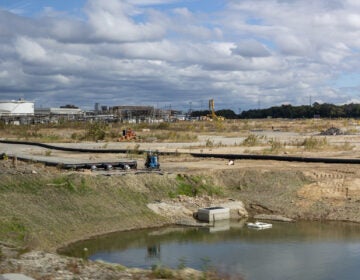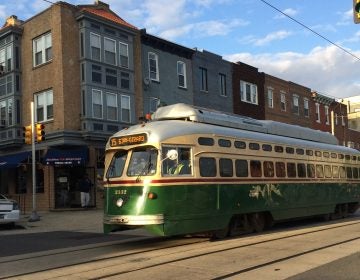5 power moves changing Philly neighborhoods for 2020
PlanPhilly’s look back at 2019 focuses on changes in renter’s rights, preservation policy, and exclusionary planning.

An artist's rendering shows an apartment complex planned for 2157 E. Lehigh Ave. (DesignBlendz/B.S.K.M./PlanPhilly.)
From shouting matches over bedbugs to secretive meetings about the city’s most controversial tax break, Philadelphia City Hall saw plenty of drama over real estate and development in 2019. A series of long-burning reforms advanced, changing the rules that govern renters’ rights, construction, preservation and certain small businesses. These issues feel increasingly important to many residents facing unprecedented levels of neighborhood change.
Rise of renters’ rights
Philadelphia has long prided itself on being “The City of Homes.” Despite its staggering poverty rate, the city has a far higher proportion of homeownership than other major American metropolises. Politically, that’s meant homeowners tend to dominate hyper-local policymaking, winning both support for lower-income owners and zoning that suits their perceived interests.
But since the Great Recession, renters have become more prominent both in fancy new buildings downtown and in working-class neighborhoods. Organizations like the Philadelphia Tenants Union have emerged to push for more protections for renters and more politicians have emerged to champion such legislation.
2019 opened with a very modest win, as Mayor Jim Kenney signed a minor bill that would require landlords have “good cause” to evict tenants on month-to-month leases. At the ceremony, activists wielded signs reading “A First Step” and promised to push for right-to-counsel legislation, which would guarantee lawyers to tenants in rent court.
Twelve months later, right-to-counsel is law and, after a fierce lobbying battle, a regulation on bedbug remediation was decided in a more tenant-friendly fashion. Next, the activists say they want to pursue some kind of rent regulation that protects tenants from inflating housing costs.
Preservation policy moves into the 21st century
Philadelphia is one of the U.S.’ only two World Heritage Cities and preservation activists have long used that designation as a rhetorical cudgel against local policymakers who show little interest in their issue. A smaller proportion of Philadelphia’s buildings are protected from demolition when compared with peer cities, and the Historical Commission’s budget is still quite small for a city of almost 1.6 million people. The city has passed no new preservation laws in decades.
But this year, in the wake of Mayor Jim Kenney’s historic preservation task force, legislative progress was finally made. Four bills were passed by City Council which, among other things, scrapped parking minimums on historic buildings and allowed accessory dwelling units in protected buildings, to help offset the price of maintaining the aging structures.
If these advances were not quite as sweeping as preservation advocates would have liked, they still marked the growing acknowledgment that Philadelphia needs to act to protect the structures that shape its unique identity. Even former antagonists, like City Councilmember Curtis Jones, have changed their tune in recent years. In the beginning of the decade, Jones helped put a historic district for Overbrook Farms on hold. He now he supports the idea—which is one of the reasons it was finally enacted in 2019 after almost a decade of delay—along with another district protecting SEPTA’s cast-iron subway entrances.
It’s no longer the ‘90s when it comes to Philly’s 10-year tax abatement
After years of delay, and increasing public dissatisfaction, Philadelphia’s political class finally altered the 10-year property tax abatement on new residential properties.
The tax break was born in the late 1990s when the city was hemorrhaging population to the suburbs and seeing barely any new housing construction. The abatement came up repeatedly during the 2019 election, with the Working Families Party candidates making a special point of running against it. And after Kendra Brooks knocked off one of the Republicans in the November elections, the issue that had been languishing in City Council for years suddenly shot to the top of the agenda. In a pell-mell final few weeks of the 2019 legislative term, Council passed changes to the policy, essentially halving its value for residential development. A cap on the value of the abatement, which the real estate industry fiercely opposed, was killed in its cradle.
Abatement critics like Brooks and Councilmember Helen Gym still talk about further changes, but it is likely that the new rules will stay put, at least through 2020.
Exclusionary planning wins
For all the talk of building a more equitable, inclusive Philadelphia, plenty of rules designed to keep people in their place progressed in 2019.
In the Far Northeast, Brian O’Neill outlawed food carts and trucks from almost his entire district, affecting many small, minority-owned businesses. At the behest of powerful real estate interests, City Councilmembers Darrell Clarke and Jannie Blackwell issued more localized bans, displacing more of these small businesses.
City Councilmember Bobby Henon enacted a ban on hookah lounges and other smoking establishments across much of the city, a move that will snuff out untold numbers of businesses owned and frequented by members of the city’s North African, Middle Eastern, Latinx and immigrant communities. When Henon was asked by PlanPhilly why such a punishing law was needed, he used language that described the growth of hookah lounges as an infestation.
But even as these often racially-coded attempts to keep people and businesses out succeeded, other exclusionary zoning efforts failed to progress in 2019. A legally-dubious effort to ban multi-family variances by City Council President Darrell Clarke never progressed, nor did a ban on duplexes around Temple University. Councilmember Kenyatta Johnson’s attempt to ban bay windows from his district passed through committee, but he ended up abandoning it (to the audible laughter of his colleagues) after a cavalcade of criticism and mockery. Councilmember Brian O’Neill tried to ban roof decks from his district. Although the advisory body managed to kill the legislation, they only did so by taking advantage of a power that they can only utilize at the end of a four-year council session—essentially delaying the bill to death. But O’Neill will be back for his 40th year on City Council next year, and he can easily just re-introduce it again.
Building trades show their mettle
Few active today in Philadelphia politics remember a time when Philadelphia’s building trades unions weren’t important allies. They raise big money and get voters out reliably, making them helpful friends, even for newbie reformers like Councilmember Helen Gym.
2019 was by no means an easy year for this more conservative wing of the city’s organized labor movement. At the beginning of the year, eight leaders of International Brotherhood of Electrical Workers Local 98 were indicted by federal authorities. Those ensnared in the legal imbroglio included City Councilmember Bobby Henon and the union’s business agent—and head of the city’s Building Trades Council—John “Johnny Doc” Dougherty.
In the wake of this federal action, Doc’s politically potent union didn’t exert its power as much as it usually did, taking little public action during the debate over the 10-year property tax abatement, for example. Even their sway in local politics looked less impressive than usual in the 2019 elections, as building trades favorite Dan Tinney went down in defeat during the at-large council election, and other trades allies like Jannie Blackwell and Al Taubenberger lost their reelection bids.
Amid the doom, gloom and indictments though, the trades leveraged their residual power for a few key wins.
In January, Sheet Metal Workers Local 19 won changes to the fire code leaders had fought for since 2012. The union argued that the reform was essential for public safety, but opponents in the real estate sector said that it was unnecessary and merely a make-work bill to boost hours for union members. Nonetheless, City Council passed it unanimously.
Then this fall, an accord was reached between residential developers, Plumbers Local 690 and the city’s Department of Licenses and Inspections. Philadelphia is one of the new cities that still mandated iron piping instead of cheaper, more lightweight plastic PVC piping in all buildings taller than three stories.
Real estate developers have tried to push the city closer to national norms, and after months of negotiations, they hacked out a deal that gave more flexibility for plastic piping in smaller-scale residential development—which the building trades unions rarely participate in—while preserving the old rules for high-rise residential projects and commercial buildings of any kind. The compromise preserved the iron piping which the union and their allies fought for in the exact kind of projects that are the building trade’s bread-and-butter. It was a victory for all sides, except commercial developers who did not have a seat at the table.
 WHYY is one of over 20 news organizations producing Broke in Philly, a collaborative reporting project on solutions to poverty and the city’s push towards economic justice. Follow us at @BrokeInPhilly.
WHYY is one of over 20 news organizations producing Broke in Philly, a collaborative reporting project on solutions to poverty and the city’s push towards economic justice. Follow us at @BrokeInPhilly.
WHYY is your source for fact-based, in-depth journalism and information. As a nonprofit organization, we rely on financial support from readers like you. Please give today.







